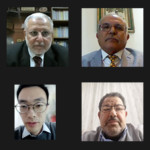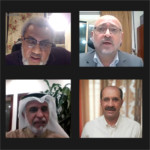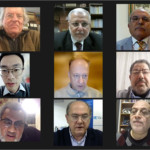Al-Zaytouna Center held, on 7/12/2021, a panel discussion on the findings of the important study conducted by renowned futures studies expert Prof. Dr. Walid ‘Abd al-Hay, and published recently by the Centre under the title “Arab Ranking in Global Indices and Its Projected Impacts.” The panel was moderated by Prof. Dr. Mohsen Mohammad Saleh, the General Manager of al-Zaytouna Centre, with wide participation of Arab and international experts and think tanks.
Prof. Walid ‘Abd al-Hay stressed the importance of futures studies and their role in forging policies and foreseeing political transformations and changes, hence their importance to the political decision maker. As for the mentioned study, he indicated that the sources of information he relied on were taken from official sources and international institutions such as the World Bank, United Nations institutions, and Arab and international research centers, where figures were largely consistent.
‘Abd al-Hay highlighted the criteria he used in the study, which reflect the actual conditions of a country when comparing it with other countries rather than those criteria derived from “impressions” prevailing in local and non-local public opinion. Thus, his study is based on the quantification of certain indices.
He added that contemporary models of quantification of political, economic and social phenomena are based on a number of steps adopted by most political measurement models; i.e., to measure a certain phenomenon, a number of indices are chosen. These indices are divided into sub-indices. The study was based on ten main indices: Democracy, Political Stability, Gini (income inequality), Militarization, Globalization, R&D expenditure, Crime, Poverty, Health Expenditure and Literacy. These indices have 413 sub-indices, which have been given specific weights on the basis of the Cross Impact Matrix, where the correlation coefficient between each sub-index and the rest of the indices is measured to know its effect (positive or negative), and accordingly weights are distributed over the indices.
‘Abd al-Hay highlighted some of the difficulties he faced as he prepared the study and which must be taken into account when setting the results, most importantly is that some Arab countries witnessed difficult circumstances during the 2010–2020 study period, which caused significant changes in the value of indices compared to the rest of the countries. Therefore, the indices of the three years before the decade of the Arab turmoil were considered, and their value in the last three years (2018–2021). Then, the average value of a certain country was concluded, while taking into consideration more than one model for precision purposes. In addition, the impact of the turmoil decade (2010–2020) was more severe on some Arab countries, which affected the results. Therefore, to determine the mega-trend of the index, some results have been modified based on the trend of the measured index, using the statistical technique of time series analysis, used in future studies.
Prof. ‘Abd al-Hay considered the number of countries on a regional basis is a fixed one (19 Arab countries that were measured). The study concluded that there are 17 countries whose scores have dropped after the turmoil decade, including 5 countries that bore the brunt of this decline, namely Syria, Yemen, Libya, then Lebanon, and finally Sudan. ‘Abd al-Hay asserted that, according to the study, the decline in Egypt’s ability to lead the region is a reflection of the decline in its achievements and ranking in development indices, as it ranked 14th in the Arab world, and failed to rank first or second in any of the ten indices. There is also a decline in the indices for the Arab countries, amounting to 47.2%.
‘Abd al-Hay said that it was noticeable, through the study, that in the main indices, which have a high relative weight, Arab countries have scored the worst, such as democracy, political stability and militarization, and these represent 45.2% of the total weight of all indices. Since these three indices are of a structural nature, they influence the rest of the indices the most, and are considered their drivers as termed by futures studies. This means that any shifts in the Arab position depend mainly on the change of these three indices.
Speaking about the general trend of political stability in the Arab countries for the next four years, ‘Abd al-Hay said that the political stability index is the most comprehensive among the indices, and therefore the stability index tends to decline in general due to the expected decline in the rest of the major indices. He asserted that 64.7% of the Arab world live in an unstable environment, while the rate of instability in the Arab region is three times that of the rest of the regions, and that the region seems to be heading into worse conditions.
As for indices of political stability in the non-Arab regional powers, which include Israel, Turkey and Iran whose influence on Arab affairs is direct and continuous, the trend of instability is equally increasing in Iran and Israel, which will be reflected in one way or another on the Arab region and increase the tension there. Although Turkey witnessed clear improvement in its stability rate during the measurement period, this improvement declined in 2020 and became negative in 2021. In general, the mutual influence between Arab instability and the instability of non-Arab regional powers indicates more turmoil for both Arab and non-Arab sides.
He also talked about US disengagement from the Middle East, which created a geo-strategic vacuum that the rising powers (China and Russia) will employ. This might prompt reconfiguration of traditional alliances, and may lead to confrontations between the forces of traditional regional alliances and the forces leaning to new alliances.
Prof. Dr. Walid ‘Abd al-Hay concluded by recommending determining the positions and policies of the Arab regimes based on quantitative approaches to get rid of the burdens of the “Cognitive Dissonance” theory. He also called on the Arab powers to start developing proactive adaptive strategies in order to employ future geo-strategic transformations to their advantage.
In their interventions, the participants stressed the importance of the study, especially the diversity of the indices it relied on, and its importance in determining the future of the region, forging state policies and putting future plans.
As for Dr. Qin Tian, deputy director of the Institute of Middle East Studies at the China Institutes of Contemporary International Relations (CICIR), he said that paper’s conclusion is that the general situation after the Arab Spring is a little bit worse than before the Arab Spring, and that this conclusion is consistent with the Chinese scholars’ view, who consider the Arab Spring negative for the development of the Arab world. For a country, the implementation capability is much more important than the forms of governance, and efficiency is much more important than the so called democracy or democratic institutions, he added.
Prof. Dr. Saifuddine ‘Abdul Fattah, head of Insan Center for Civilization Studies, considered that the countries which witnessed change movements that were suppressed, are living now a false stability based on backwardness rather than advancement and progress. He added that the study is alerting the region that an instability phase and structural, social, political and economic problems lie ahead.
Dr. ‘Abdulhalim Fadlullah, the general manager of the Consultative Center for Studies and Documentation, said that the indicators mentioned in the study describe the reality without going deep into details, and this may lead to a sudden halt, like the Arab Revolutions; for in Egypt, while indicators and reports indicated that the political regime is stable, we were surprised by the outbreak of the January 25 revolution. Also, in Lebanon, although the economy was relatively stable and growing, it did not prevent the deterioration of the political and economic situation in early 2019.
As for Dr. Sami al-Arian, director of the Center for Islam and Global Affairs (CIGA), he wondered whether the information that ‘Abd al-Hay had obtained and the equations he used, were of his own or were they taken from other indices. He also wondered about the criteria, if they are suitable to be used in the case of Arab countries and societies. As for the weights, he said that there are some weights that may be suitable for Western countries but perhaps not suitable for Arab countries, thus stressing the need to know more about the sub-indices used in order to be more accurate in evaluating the study. Al-Arian wondered about the applicability of some terms [indices] to our societies, such as the Democracy index that includes 60 sub-indices, Globalization and Militarization. Concerning the Militarization index, ‘Abd al-Hay based his ranking on the concept of Militarization defined by the Stockholm International Peace Research Institute (SIPRI), so al-Arian wondered if this is suitable or not suitable to the study.
Dr. Andrey Kortunov, director general of the Russian International Affairs Council (RIAC), considered that the Gini index is a very good indicator of social discrepancies, but it should be supplemented by indices reflecting social mobility. He stressed the importance of the migration indicator, since it reflects the successes or failures of state building and the efficiency of state. Commenting on ‘Abd al-Hay’s conclusions, Kortunov wondered how much worse and how long will the stability conditions likely to stay negative, are we approaching a breaking point? are we in the end of this disintegration trajectory and this negative cycle? or are we just in the very beginning of this cycle?, and things will likely to continue get worse for another, 5, 10 or 20 years.
‘Atef al-Joulani, the political and media expert, and editor-in-chief of the Jordanian Assabeel newspaper, suggested that this study be transformed from a study based on an individual effort to a one done by an institution, thus increasing its value and importance.
Former Ambassador and the Executive President of the European Institute of the Mediterranean (IEMed), Dr. Senén Florensa, indicated that in the study the Arab region is presented as a homogeneous region, which it is in certain aspects, but it is not in very important respects. For example the division between oil exporters and importers, which makes a very sharp distinction and different explanation for all economic and other variables. The study has examined the indices for a long period, but perhaps not long enough, for the things we are dealing with are social economic changes where some of them do not take years but rather generations to change. Florensa wondered how this study could be used, especially that there are no hints how to make linkages between all these variables. He concluded that it is a good mapping but he’s eager to know how to use it to exploit the value of all these data.
Dr. Khairy Omar, the political science professor at Sakarya University-Turkey and Dr. Abdessatar Rejeb, the sociology professor at the University of Carthage in Tunisia, have stressed the importance of this type of research that depends on quantitative analysis and can be relied upon in studying political events in the Middle East region. However, the study needs to explain more about its methods of reaching such conclusions. It was wondered if the inter-Arab interference factor was taken into consideration, where the Arab countries are competing over the leadership of the Arab world.
Dr. Daud Abdullah, the director of Middle East Monitor (MEMO), London, wondered why things will get worse in this region, is it because of the over-spending on arms, is it because of corruption in public office, is it because of the suppression of freedoms, or the disappearance of academicians and experts, as happened in Iraq and other countries.
Dr. Faruq Tayfour, the Algerian professor of political science and international relations, stressed the importance of ‘Abd al-Hay’s study and hoped that the Arab world would have institutions that are specialized in Futures Studies due to their importance and impact on determining the policies of the region. Tayfour suggested adding another criteria, which is how much is the Arab region targeted.
Dr. Raed Neerat, assistant professor of political science at An-Najah National University-Palestine, asked if the numbers used in the study match the Arab reality, and if the R&D spending goes to real scientific research in the Arab world. He wondered about the scientific research and its trends, and whether they serve development, wondering the same about the other indicators?
Mohamed Salem al-Rashed, chairman of the Strategic Thinking Group Society and the head Ofok Center For Consultancy-Kuwait, wondered about the use of indicators developed in an advanced Western civilized society compared to their usage in a backward Arab society that cannot deal with them in an objective scientific way.
Then, ‘Abd al-Hay clarified some points to the interveners; emphasizing that the references used in the study, the methodology, indicators and measurement method are available. As for the question: what mechanisms can be used to benefit from this study in forging public policies, ‘Abd al-Hay said that this is the role of decision-makers.
Concerning the term “turmoil decade,” ‘Abd al-Hay indicated that he has looked at the transformations of the region from a certain angle. For example, the unusually accelerating technological changes are faster than social adaptation, which would result in a gap between a technology dominated era, on one hand, and political and social values, on the other hand, adding that we may need a long time to get used to these changes. Hence, this gap may increase the turmoil and future studies warn about what’s coming in order to be prepared.
At the end, ‘Abd al-Hay said that he has objectively diagnosed the existing data, regardless of the discrepancies in some numbers, and that these indices indicate an acceptable condition, based on the weight of the index and its impact on future variables.
Watch Now (Original Sounds):
| Click here to download: >>Academic Paper: Arab Ranking in Global Indices and Its Projected Impacts … Prof. Dr. Walid ‘Abd al-Hay |
Al-Zaytouna Centre for Studies and Consultations, 9/12/2021









Leave A Comment